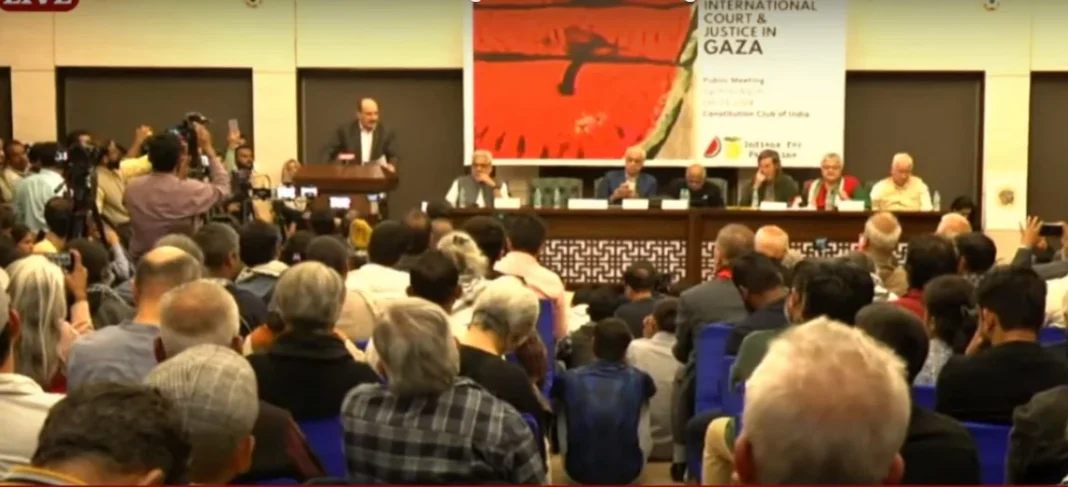Anwarulhaq
New Delhi, February 25, 2024: In a powerful display of solidarity, Indians For Palestine, a group of concerned citizens, gathered in New Delhi for a public meeting on Friday to discuss the implications of a crucial ruling by the International Court of Justice (ICJ) and to express support for Palestine. The meeting, attended by representatives from various section of society, reflected the widespread concern and empathy among Indians for the people of Palestine, who are facing an ongoing assault by Israel.
Stand for Palestine! Stand for Humanity! Ceasefire Now!
The Palestinian Ambassador to India, Adnan Abu Al-Haija, delivered a passionate address accusing Israel of implementing a strategy to evacuate Palestinians from their homeland.He vowed that despite the challenges, the Palestinian people are determined to live and die in the land of Palestine. The overflowing meeting hall resonated with resounding slogans of “Ceasefire Now!” as participants from different walks of life came together to voice their support.
The session featured prominent speakers, including lawyer Anand Grover, former ambassador K.P. Fabian, journalist Siddharth Varadarajan, and political leaders such as Dipankar Bhattacharya, Amarjeet Kaur, and Subhashini Ali. Anand Grover highlighted the lack of courage from countries, especially India, in standing against Israel, contrasting it with the bold stance taken by South Africa. K.P. Fabian emphasized that standing with Palestine equates to standing for justice, criticizing the international community for allowing the genocide to persist.
Siddharth Varadarajan drew attention to the alleged complicity of the current Indian government with Israel’s actions, citing the delivery of drones in early February. The sentiments echoed by political leaders across party lines, with Salman Khurshid endorsing Indians for Palestine and calling for an immediate ceasefire. Amarjeet Kaur highlighted the refusal of dockworkers to load weaponized cargo for Israel, showcasing the disconnect between the government and the people.
Dipankar Bhattacharya pointed out parallels between the Modi government’s actions and the Israeli blueprint against farmers and dissenters. The unanimous call for an immediate ceasefire echoed through the resolutions passed during the meeting. Indians for Palestine urged the Indian government to endorse the ICJ ruling publicly and stand against human rights violations in Gaza.
Amidst this growing solidarity, the death toll in Israel’s assault on Gaza has reached alarming numbers, with over 29,000 casualties, mostly women and children. Shockingly, the toll includes 85 journalists, 152 UN workers, 600 health workers, and 12,000 children. The long-term impact extends beyond casualties, encompassing deepening poverty, a severe water crisis, healthcare system shutdowns, and chronic trauma.
The meeting also highlighted the historic ICJ ruling on January 26, 2024, holding Israel accountable for violating the Genocide Convention in its attacks on Gaza. The ruling imposes a moral and legal obligation on countries, including India, to cease funding or facilitating Israel’s military actions. India’s close collaboration with Israel, particularly in defense and surveillance, has raised concerns, with recent reports of military drones being sent to Israel.
President Cyril Ramaphosa’s statement from South Africa, drawing parallels with the fight against Apartheid, underscores the shared legacy with India. However, the Indian government’s reluctance to condemn Israel’s actions remains evident, causing dismay among those expecting a more assertive stand.
The call to cease collaboration with Israel and refrain from any complicity gains momentum as Indians for Palestine urges people across Asia to express solidarity. The Water Transport Workers Federation of India’s refusal to cooperate with loading or unloading weaponized cargoes adds weight to the movement.
As the world grapples with the ongoing crisis, the narrative in India becomes increasingly complex, intertwining geopolitical alliances, historical legacies, and the collective conscience of its people. The call for a ceasefire resonates not just for Palestine but for humanity, prompting reflection on India’s role in a conflict that transcends borders.

